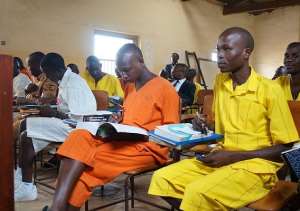
Education in Africa, especially, studying at the university, involves a lot of money, therefore, in a continent that many are uneducated, with a high rate of child labour, and prostitution, the society breeds thieves, armed robbers and all sorts of criminal activities, since the devil provides work for idle hands.
Coming out of prison, the fact that many lack education and therefore, can’t get any job and also lacked training in any meaningful job, prisoners are faced with the fact that they cannot adapt to a free life and soon find themselves behind bars again.
No employer likes to employ a prisoner, since many of them are hardened criminals, assassins, and dangerous to society, however, the crime rate can be reduced if governments train prisoners in different fields such as carpentry, welding, masonry, building, etc, for them to have a meaningful life after prison.
In some countries, especially Africa, many governments believe giving prisoners hard training and discipline could help them to live a meaningful life in society but discipline and sentence alone don’t help prisoners. They can tell you more.
In advanced countries, hardly one hears of armed robbery even though there are burglars. To deal with this social problem, thousands of prisoners across the world are given the opportunity to learn desired professions.
Apart from the training, many have in painting, building, auto-repairs, welding, etc, some prison convicts study by correspondence, receiving higher education.
It’s the burden of the government to see the prisoners receive education to give them a better life after serving their sentence. Thus, after liberation, some prisoners are able to open their own businesses or find interesting work.
There are special training platforms equipped with computers in many countries for prisoners. The computers have webcams for communicating with teachers and participating in various online courses if necessary. Those convicted using the Internet also receive tasks and send tests.
For example, last year, more than 100 convicts received a diploma of completion for higher education in Russia.
According to the report, not only convicts sentenced by the court to a certain term of deprivation receive higher education but also those sentenced to life in prison. The prison employs them to work for incoming new mates.
While the crime rate in Africa is increasing rapidly, those of the advanced countries have been reduced drastically because they use education opportunities in prison as a key to reducing crime.

Federal financial aid grants support prisoners’ education in America
Officials monitoring prisoners’ education reveal that convicts that receive vocational training and those with higher education, don't often commit repeated crimes. Many choose to live meaningful lives because they were given the keys to a successful life through education.
While many incarcerated in prisons at the United States of America are denied education, 24% of people in federal prisons have received courses for higher education.
Instead of building more prisons and increasing the police force on the streets, without any benefit for the state, African leaders should focus on educating and rehabilitating prisoners to reduce recidivism.




 We’ll no longer tolerate your empty, unwarranted attacks – TUC blasts Prof Adei
We’ll no longer tolerate your empty, unwarranted attacks – TUC blasts Prof Adei
 Bawumia donates GHc200,000 to support Madina fire victims
Bawumia donates GHc200,000 to support Madina fire victims
 IMF to disburse US$360million third tranche to Ghana without creditors MoU
IMF to disburse US$360million third tranche to Ghana without creditors MoU
 Truck owner share insights into train collision incident
Truck owner share insights into train collision incident
 Paramount chief of Bassare Traditional Area passes on
Paramount chief of Bassare Traditional Area passes on
 Two teachers in court over alleged illegal possession of BECE papers
Two teachers in court over alleged illegal possession of BECE papers
 Sunyani: Victim allegedly shot by traditional warriors appeals for justice
Sunyani: Victim allegedly shot by traditional warriors appeals for justice
 Mahama vows to scrap teacher licensure exams, review Free SHS policy
Mahama vows to scrap teacher licensure exams, review Free SHS policy
 Government will replace burnt Madina shops with a new three-story, 120-store fac...
Government will replace burnt Madina shops with a new three-story, 120-store fac...
